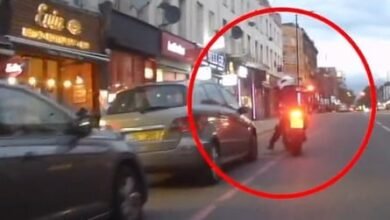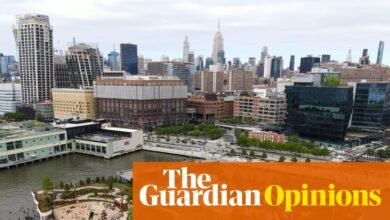‘Moscow must hear: stop,’ says Zelenskyy as he warns against rewarding Russia for war ahead of Trump meeting – Ukraine war live | Ukraine

‘Moscow must hear: stop,’ Zelenskyy says, as he warns against rewarding Russia for war
Ukrainian president Volodymyr Zelenskyy has offered his response to overnight Russian strikes on Ukraine saying they were “demonstrative” of Russian intentions and showing its “cynical” position on war.
He said:
“And at this very moment, the Russians are attacking Kharkiv, Zaporizhzhia, the Sumy region, and Odesa, destroying residential buildings and our civilian infrastructure.
Russians are deliberately killing people, particularly children. As of now, seven people have been killed as a result of the drone strike in Kharkiv, the youngest being a girl who is only a year and a half old, and dozens have been injured, including children.
In Zaporizhzhia, missile strikes injured 20 people and killed three. My condolences go out to all of the victims’ families and loved ones.
There was also a deliberate Russian strike on an energy facility in Odesa owned by an Azerbaijani company, implying that it was an attack not only on us but also on our relations and energy security.”
He also pointed out the obvious context of the attacks:
“They are aware that a meeting is taking place today in Washington that will address the end of the war. We will have a discussion with President Trump about key issues.
Along with Ukraine, the leaders of the United Kingdom, France, Germany, Italy, Finland, the European Union, and Nato will participate in the conversation.
Everyone seeks dignified peace and true security.”
In a stark warning about Russia’s intentions, Zelenskyy also said that “the Russian war machine continues to destroy lives despite everything,” as “Putin will commit demonstrative killings to maintain pressure on Ukraine and Europe, as well as to humiliate diplomatic efforts”.”
“That is precisely why we are seeking assistance to put an end to the killings.
That is why reliable security guarantees are required.
That is why Russia should not be rewarded for its participation in this war.
The war must be ended.
And it is Moscow that must hear the word: ‘Stop.’”
Key events
UK’s Starmer ready to back Ukraine peace deal without ceasefire as precondition
UK prime minister Keir Starmer’s spokesperson has been speaking to the media in the last half hour, suggesting that the UK would back a Ukraine peace deal without a ceasefire as a precondition, PA reported.
“We’ve always said we want to see a sustainable and just peace for Ukraine.
One that ensures peace returns to Europe and the Ukrainian people can live without fear of attack again, and an agreement that delivers that as soon as possible, but ends the killing and translates that into a lasting peace supported by security guarantees, would be a significantly positive step.”
Pressed on whether that marked a change of position, Starmer’s spokesperson said:
“We want to see an end to the killing. If you can bring about an end to the killing and bring about a sustained peace in one go, then all the better.”
Ukraine’s borders are for the country to determine itself in negotiations, he added, stressing that “international borders must not be changed by force.”
Germany’s Merz finds silver lining in Trump’s Alaska summit, but commiting troops continues to divide politicians

Deborah Cole
in Berlin
Germany’s chancellor Friedrich Merz, who boarded a dawn flight to Washington on Monday, had found a silver lining for the Europeans out of the Alaska summit, saying on Saturday the United States was ready to be part of security guarantees for Ukraine under a peace deal.
Trump’s pledge, however, was decidedly vague, as European leaders said at least some US boots would need to be on the ground in Ukraine for the guarantee to carry any weight as a deterrent against further Russian aggression.
After Trump advisor Steve Witkoff suggested the security guarantees could be comparable to an Article 5 mutual defence protection within Nato, it begged the question whether the Europeans would commit troops of their own for Ukraine.
At least in Germany, the response appeared muted at best.
German vice-chancellor Lars Klingbeil told ZDF public television he wouldn’t rule anything out but stopped well-short of a full-throated pledge.
“Now it’s about getting a ceasefire and then we can talk about everything else,” said Klingbeil, a Social Democrat.
But for the foreign minister, Johann Wadephul of Merz’s Christian Democrats (CDU), the answer was a flat no, citing the growing presence of German soldiers in Lithuania – Berlin’s first permanent foreign troop deployment since the second world war.
“To do that (station an armoured brigade in Lithuania) and on top of that station troops in Ukraine would probably overtax us,” Wadephul told podcast Table.Today.
German officials attempted to sound bullish ahead of Monday’s meetings in Washington, underlining the united European front.
“Speaking directly with Donald Trump in person will certainly have an impact,” CDU MP Norbert Röttgen, a leading voice on foreign policy, told the German edition of Politico.
We see ourselves as Ukraine’s main supporter. European security is now a European matter – but we want to keep the Americans on board.
Armin Laschet, head of parliament’s foreign affairs committee, saw the glass half full after the Alaska talks, noting that the lack of a deal also meant that no one-sided deal was agreed without Ukraine’s president Volodymyr Zelenskyy.
Regarding any commitment of German troops as part of a security guarantee, Laschet told Berlin’s Inforadio he did not rule it out but remained guarded.
“You can’t answer the question until you know the conditions. Is it in agreement with the United Nations? Is there a UN mandate? Did Russia agree to it?”
‘Moscow must hear: stop,’ Zelenskyy says, as he warns against rewarding Russia for war
Ukrainian president Volodymyr Zelenskyy has offered his response to overnight Russian strikes on Ukraine saying they were “demonstrative” of Russian intentions and showing its “cynical” position on war.
He said:
“And at this very moment, the Russians are attacking Kharkiv, Zaporizhzhia, the Sumy region, and Odesa, destroying residential buildings and our civilian infrastructure.
Russians are deliberately killing people, particularly children. As of now, seven people have been killed as a result of the drone strike in Kharkiv, the youngest being a girl who is only a year and a half old, and dozens have been injured, including children.
In Zaporizhzhia, missile strikes injured 20 people and killed three. My condolences go out to all of the victims’ families and loved ones.
There was also a deliberate Russian strike on an energy facility in Odesa owned by an Azerbaijani company, implying that it was an attack not only on us but also on our relations and energy security.”
He also pointed out the obvious context of the attacks:
“They are aware that a meeting is taking place today in Washington that will address the end of the war. We will have a discussion with President Trump about key issues.
Along with Ukraine, the leaders of the United Kingdom, France, Germany, Italy, Finland, the European Union, and Nato will participate in the conversation.
Everyone seeks dignified peace and true security.”
In a stark warning about Russia’s intentions, Zelenskyy also said that “the Russian war machine continues to destroy lives despite everything,” as “Putin will commit demonstrative killings to maintain pressure on Ukraine and Europe, as well as to humiliate diplomatic efforts”.”
“That is precisely why we are seeking assistance to put an end to the killings.
That is why reliable security guarantees are required.
That is why Russia should not be rewarded for its participation in this war.
The war must be ended.
And it is Moscow that must hear the word: ‘Stop.’”
Hungary, Ukraine clash over criticism for attack on Russian oil pipeline
Meanwhile, the Ukrainian foreign minister clashed with his Hungarian counterpart on social media this morning after Hungary accused Ukraine of an attack on a Russian oil pipeline.
Earlier this morning, Péter Szijjártó heavily criticised Ukraine for an attack on a Russian pipeline leading to Hungary, calling it “outrageous” and “unacceptable.”
The Hungarian minister said:
“Ukraine has once again attacked the oil pipeline leading to Hungary, cutting off supplies. This latest strike against our energy security is outrageous and unacceptable!
Russian deputy energy minister Pavel Sorokin informed me that experts are working to restore the transformer station essential for operating the pipeline, but for now they cannot say when deliveries will resume.
For 3.5 years Brussels and Kyiv have tried to drag Hungary into the war in Ukraine. These repeated Ukrainian attacks on our energy supply serve that same purpose.
Let me be clear: this is not our war. We have nothing to do with it, and as long as we are in charge, Hungary will stay out of it.
Finally, a reminder to Ukrainian decision-makers: electricity from Hungary plays a vital role in powering your country …”
His comments, including a thinly veiled threat against Ukraine, sparked an immediate reaction from Ukraine’s foreign minister, Andrii Sybiha, telling him to take his complaints to Moscow.
“Peter, it is Russia, not Ukraine, who began this war and refuses to end it.
Hungary has been told for years that Moscow is an unreliable partner.
Despite this, Hungary has made every effort to maintain its reliance on Russia. Even after the full-scale war began.
You can now send your complaints – and threats – to your friends in Moscow.”
Seven dead, 20 injured in Russian attack on Kharkiv
Separately, at least seven people were killed and some 20 injured in a separate attack on Ukraine’s second largest city, Kharkiv, agencies reported.
Six children aged 6 to 17 were among 20 other people injured in the attack on Ukraine’s second largest city, Oleh Synehubov, governor of the wider Kharkiv region, wrote on Telegram.
A ballistic missile attack shattered around 1,000 windows in various buildings in the city, Synehubov said. Some residents had to be evacuated from their homes, officials said.
“Russia is a murderous war machine that Ukraine is holding back. And it must be stopped through transatlantic unity and pressure,” Ukrainian foreign minister Andrii Sybiha wrote on X after the attack.
17 injured in overnight Russian attack on Zaporizhzhia
The number of people injured in the Russian shelling of Zaporizhzhia has increased to 17, according to the latest update from the Ukrainian army.
Its statement added:
The number of victims is being specified. The blast wave and debris damaged residential buildings and commercial premises, and a bus stop was partially destroyed. The necessary services are working at the scene.
Meanwhile, showing growing concern about how the signals coming from the US are being understood by Russia, Zelenskyy’s top aide, Andriy Yermak, posted a video of a Russian armoured vehicle carrying two flags, of Russia and the US.
“Russian propagandists show a video in which Russian military equipment goes on the assault with the flags of Russia and the US.”
He continued:
“The Russians are using the symbols of the US in their own terrorist war of aggression, marked by the killing of civilians.”
“Utter arrogance,” he added.
Trump’s tone on ending war likely to alarm Europeans ahead of talks — snap analysis

Jakub Krupa
In one of many posts on social media overnight, US president Donald Trump claimed that “president Zelenskyy of Ukraine can end the war with Russia almost immediately, if he wants to”.
His comments are likely to alarm European leaders as they could signal growing US pressure on Ukraine to accept a deal, however imperfect or outright bad it is, as Trump is determined to secure a diplomatic success after his meeting with Vladimir Putin on Friday.
We all remember what happened during Zelenskyy’s last visit to the White House – even if US state secretary, Marco Rubio, appeared to play down apparent similarities between the two visit in his TV interview over the weekend.
But, even more worringly for Europe, Trump also added:
“Remember how it started. No getting back Obama given Crimea (12 years ago, without a shot being fired!), and NO GOING INTO NATO BY UKRAINE. Some things never change!!!”
This position by Trump appears to violate one of the European red lines for Ukraine, saying that Ukraine must not be blocked from deciding about its future.
On Saturday, European leaders adopted a statement saying:
“No limitations should be placed on Ukraine’s armed forces or on its cooperation with third countries. Russia cannot have a veto against Ukraine’s pathway to EU and Nato.
It will be up to Ukraine to make decisions on its territory. International borders must not be changed by force.”
It’s hard to reconcile the two positions – and there will be some concern that by meeting Zelenskyy first, without the Europeans, Trump could seek to pursue this line even further before he sees a concerted push back from European partners.
One to watch.
Ceasefire, security guarantees to be discussed at White House, Finnish PM says
In the last few minutes, Finland’s prime minister Petteri Orpo said that a ceasefire and security guarantees for Ukraine are the most important topics at the meeting of US president Donald Trump, Ukraine’s president Volodymyr Zelenskyy and European leaders.
Finnish president, Alexander Stubb, will be among those in attendance.

Jakub Krupa
It’s Jakub Krupa here, taking over to guide you through the day as we build up to the main event in Washington this evening.
Good morning.
Asked behind the scenes at June’s G7 summit if he could explain why Donald Trump seemed to like him so much, Keir Starmer admitted he did not really know.
But whatever the reason, when it comes to Ukraine, the UK prime minister is once again hoping to exploit this somewhat curious relationship, Peter Walker writes in this analysis.
It continues:
As soon as it was announced that a string of European leaders planned to join Volodymyr Zelenskyy to back the Ukrainian president in crucial talks with Trump at the White House on Monday, it was obvious Starmer would be joining them.
The idea of Britain being some sort of bridge between US and European interests is something of a longstanding UK diplomatic cliche, and not one that always necessarily carries much meaning.
But in the case of Ukraine, Starmer has very deliberately sought to position himself as a leader who can get along with Trump while consistently stressing to him Europe’s red lines over any peace plan, and trying to sweet-talk the president into offering US security guarantees.
You can read the full analysis here:
A Ukrainian drone intercepted by Russia near the Smolensk nuclear power plant detonated after falling but did not cause significant damage to the plant, Russia’s nuclear power corporation Rosatom said on Monday.
“The damage is insignificant, there are no casualties,” Rosatom said.
Russia’s Federal Security Service (FSB) said on Sunday it had prevented a Ukrainian drone attack on the Smolensk nuclear power plant, Reuters reports.




